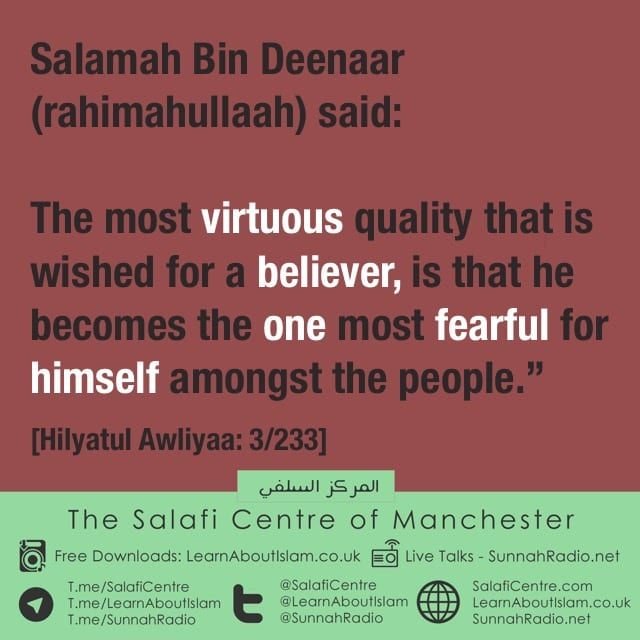In The Name of Allah, The Most Merciful, The Bestower of Mercy.
An Overview and General Examination of Certain Implications of Human Rights –[Excerpts from a Lecture by Al-Allamah Salih Aal Ash-Shaikh]
Listen here: https://www.youtube.com/watch?v=wRkeYjcJ728
The Main Purpose Behind The Creation of The Heavens and The Earth
The Shaikh – may Allah preserve him- said:
I thank and praise Allah, who knows everything about His creation and is the Most Kind and Courteous, All-Aware. He is praised with all good – praised for His commands, prohibitions, divine laws, and creations. He has guided humanity and instructed them on what leads to perfection and well-being in this life and the next. He alone deserves abundant (endless) praise, just as He has given us countless blessings. I testify that only Allah is worthy of worship, with no partners, and I testify that Muhammad is His servant and Messenger. May peace and blessings be upon him, his family, and his companions. To proceed:
My brothers, these are the blessed hours when one learns something new about his religion or strengthen what he may have forgotten over time – matters he unintentionally forgot due to the numerous engagements and distractions. There is no question that no other divine law is as perfect as Islamic law. Allah gave every Prophet a law and path, and He made Muhammad’s law complete and perfect, suitable for all times and places until the Day of Judgment.
Muhammad’s law addresses every issue, safeguards every duty, and uplifts every matter that honours the human being- honours the Muslim and raises him because he carries the message of true Islamic monotheism. Therefore, everyone is obligated to familarise with the virtues of this divine law, know its rulings, objectives, and wisdom; the obligations it established, what inspires them to preserve and promote it, and pay no attention to any caller to misguidance – those who desire to hinder humankind from the truth through various terms and slogans. We praise and thank Allah for including us among those who accept and submit to this divine law- those who learn and seek to emulate Allah’s Messenger, peace and blessings of Allah be upon him.
Allah created the heavens and the earth in order that two obligations are fulfilled: His rights and the rights of His servants. Every Messenger and the divine scriptures were revealed to explain these two obligations: to worship Allah alone, reject all false gods and rivals, and follow His Messenger in that particular era and place. Allah revealed His scriptures and sent His Messengers to establish these two obligations. Allah, The Exalted, said:
لَقَدۡ أَرۡسَلۡنَا رُسُلَنَا بِٱلۡبَيِّنَـٰتِ وَأَنزَلۡنَا مَعَهُمُ ٱلۡكِتَـٰبَ وَٱلۡمِيزَانَ لِيَقُومَ ٱلنَّاسُ بِٱلۡقِسۡطِ
Indeed We have sent Our Messengers with clear proofs, and revealed with them the Scripture and the Balance (justice) that mankind may keep up justice. [Al-Hadid. 25]
Allah said:
وَلَقَدۡ بَعَثۡنَا فِى ڪُلِّ أُمَّةٍ۬ رَّسُولاً أَنِ ٱعۡبُدُواْ ٱللَّهَ وَٱجۡتَنِبُواْ ٱلطَّـٰغُوتَ
And verily, We have sent among every Ummah (community, nation) a Messenger (proclaiming): “Worship Allah (Alone), and avoid (or keep away from) Taghut (all false deities, etc. i.e. do not worship Taghut besides Allah).” [Al-Nahl. 36]
Because of this, the Messenger, peace and blessings of Allah be upon him, said: “O Mu’adh! Do you know what is the right of Allah upon His servants?” I (Mu’adh) said, “Allah and his messenger know best”. The Prophet said, “To worship Him alone and associate none in worship with Him. And do you know what is their right upon Him?” I said, “Allah and his messenger know best”. The Prophet said, “Not to punish them if they do so”. [Al-Bukhari 6938]
The obligations imposed by all divine laws in general and Islamic law, in particular, are to uphold Allah’s rights, the rights of the creation, and the rights of individuals. There is no doubt that when you contemplate the Qur’an and the Sunnah of Allah’s Messenger, this will become abundantly evident.
Human rights is among the rights that is often mentioned in this era. This term, which is the focus of this lecture, relates to various areas of study, including Islamic law, the Islamic creed, the administration of justice, politics, and financial matters (economics). It is also linked to what the major powers of the UN refer to as Human Rights. As you are aware, this term has a history and is a new idea that is not found in the Qur’an and Sunnah, nor has it been used by the Imams and scholars of Islam to define rights. Instead, the Qur’an and Sunnah address rights and the responsibilities we have towards each other.
A new world order was created when World War II started, which the Allies won. America triumphed over its enemies, leading to the formation of the United Nations. The term “New World Order” did not come about after the Gulf War; it actually began with ideas and principles that arose after World War II. The Major powers use this term when they want to impose something new on society, people, and nations, regardless of their cultural backgrounds. To exert influence over all nations, the main powerful countries aimed to build a new world order after the war. This influence can be cultural, sometimes shown through strong opinions and freedoms, and at other times, it involves interfering in the matters of nations they want to influence. A document with thirty articles was drafted by the United Nations and included in the new international organisation in 1948. Later, revisions and additions were made to the document, which became known as the Universal Declaration of Human Rights. With the additions currently made, this document represents the human rights they advocate. The United Nations and Western nations’ support for human rights is centered on two issues: freedom and intergroup equality. Among the provisos were those that forbade specific kinds of dealings and limited the state’s authority over its citizens. Many nations’ affairs were meddled with and dictated by Western nations and the UN; consequently, some nations’ reputations may be damaged as a result of what they failed to do. Due to meddling in their lives, questioning them about what they did to obtain these freedoms, and bringing up specific instances, the interference may be more pronounced.
The Declaration of Human Rights has its own circumstances and motivations, as well as goals that support the principles of the main colonial empires. This term is frequently used, however, it is obligatory for a Muslim to be proud of his religion and assured that the rights a person has are magnificent when given by Allah, The Almighty, because nobody knows the affairs of the creation and what is best for them better than Allah. Allah said:
أَلَا يَعْلَمُ مَنْ خَلَقَ وَهُوَ اللَّطِيفُ الْخَبِيرُ
Should not He Who has created know?! And He is the Most Kind and Courteous (to His slaves) All-Aware (of everything)]. [Al-Mulk. 14]
Therefore, Allah is the one who upholds the rights of humanity in accordance with the laws He has established. This is why numerous studies on the subject have demonstrated that Islamic law, the life of our Prophet, peace and blessings be upon him,, the teachings of the Qur’an and the Sunnah, as well as the deeds of the four caliphs, may Allah be pleased with them, and those who followed them, are the greatest early codifications of human rights, lofty in both their proclamation and their implementation. It was fully implemented throughout the era of the Prophet, peace and blessings of Allah be upon him, and the Rightly Guided Caliphs, may Allah be pleased with them. Many researchers have written on the subject of human rights, including some who held weak opinions and attempted to make every article of that statement a precedent in Islamic history or Islamic law. Others conducted good and knowledge-based studies in many journals and articles, and they highlighted that certain (things) of the human rights stated in the West and by the UN are affirmed by Islamic legislation, while others are in opposition with its core foundations.
This lecture will not be enough to cover everything relating to this topic, but we will give you a closer acquaintance based on the core principles of Islamic law – an understanding with no ambiguity. The genesis of a person’s rights is referred to the meaning of Allah’s statement: [وَلَقَدْ كَرَّمْنَا بَنِي آدَم – And indeed We have honoured the Children of Adam]. [Al-Israa. 70]
The honour that Allah has bestowed upon the offspring of Adam is based on two things: first, humans are honoured because of their innate sound natural disposition, physical traits, and the things that Allah has subordinated to them on the earth and in the skies. Second, Allah elevated the offspring of Adam above all other creatures, giving them preference over many of the other created beings in all matters pertaining to their happiness, their means of subsistence, and their interactions with other people. Thus, the divine legislation was sent to define Allah’s rights and those of His slaves. Allah, The Almighty, said:
وَلَقَدۡ كَرَّمۡنَا بَنِىٓ ءَادَمَ وَحَمَلۡنَـٰهُمۡ فِى ٱلۡبَرِّ وَٱلۡبَحۡرِ وَرَزَقۡنَـٰهُم مِّنَ ٱلطَّيِّبَـٰتِ وَفَضَّلۡنَـٰهُمۡ عَلَىٰ ڪَثِيرٍ۬ مِّمَّنۡ خَلَقۡنَا تَفۡضِيلاً۬
And indeed We have honoured the Children of Adam, and We have carried them on land and sea, and have provided them with At-Tayyibaat (lawful good things), and have preferred them above many of those whom We have created with a marked preference. [Al-Israa. 70]
Allah stated in the beginning of the Ayah [وَلَقَدْ كَرَّمْنَا بَنِي آدَمَ- And indeed We have honoured the Children of Adam], and at the end He said [وَفَضَّلۡنَـٰهُمۡ عَلَىٰ ڪَثِيرٍ۬ مِّمَّنۡ خَلَقۡنَا تَفۡضِيلاً۬ – and have preferred them above many of those whom We have created with a marked preference].
The creation, revelation of the divine law, the foundation of social structure, and the command that they worship Allah alone and follow the Messengers are all mentioned.
According to Westerners, the rights that fall under the umbrella of “Human Rights” are divided into two categories: freedom and equality, (but) even in their own countries, the term “freedom” does not exist without restrictions. Absolute and unlimited freedom for a person to do anything he wants – without being held accountable – does not exist in any place on Earth; rather, freedoms exist where they are found, but they have limits, and people are told that anything beyond that limit is forbidden and is not freedom. This makes you understand that the word freedom is not present anywhere on the earth but in a limited sense. As for absolute freedom in everything, including dealings with wealth, politics, court judgements, one’s actions, the sanctity of life, and dealing with one’s children, this does not exist without restriction anywhere on the earth. Rather, freedom varies by country, with some countries having much less freedom than others. As a result, the word freedom, which they argue is part of human rights, is not unrestricted in their eyes. Thus, when this is the case, and they impose constraints on freedom based on the opinions of humans, we say: “Indeed, this principle shows that limiting freedom renders the word unacceptable to all humans”.
If the word freedom could be accepted (based on individual interpretations), you should grant a person the freedom to do as they please, then in that case, you would be promoting absolute freedom. However, if you limit a person’s freedom through man-made regulations while also discreetly seizing control of their wealth and abilities, then this freedom is not absolute. As a result, the basis of freedom on which one advocate human rights must be viewed from the perspective that absolute freedom does not exist. Therefore, it must be limited, which means that a person is not entirely free to behave in any location on the earth in any way they wish; rather, this freedom has boundaries that they explain and differentiate, and as a result, one discovers what is known as protocols and etiquettes. There are measures taken to deal with those who disregard the rules governing formal ceremonies and to bar anyone from entering any location while wearing any kind of clothing. Additionally, there is something that is equivalent to a lack of freedom everywhere in terms of one’s presence and speech. This is because they saw that it is not suitable to grant someone complete freedom since sometimes that freedom conflicts with what is desired and other times it conflicts with one’s relationships and other people’s rights. As a result, the notion of total freedom is negated.
The equality that they proclaimed means equality between men and women in everything and equality between all people when receiving and giving rights, such as wage equality, educational equality, the means to good health and medical treatment, equality when traveling, deciding where one wishes to reside within one’s country as stipulated in their articles, the abolition of slavery, and so on. Some aspects of this equality are acceptable, while others are not. We are not here to refute that documentary proclamation (of human rights), its corrections, and subsequent additions; rather, we are here to clarify that the flawless and lofty human rights are those that the Lord of humankind has bestowed upon the human being. When a human being wishes to grant another person rights, he will not be free of desires because the person who codifies laws, whatever they may be, will include their desires in them. As a result, Western man-made laws, such as French man-made law, American man-made law, and other man-made laws, are subject to change from time to time – either because the law was first initiated for the sake of the country’s interests when it was established, or due to the influence of (influential personalities or leaders, etc) in that country in some matters, or because time passed and thus the circumstances changed. Allah clarified that the pre-Islamic judgement is a desire-based judgement. Allah, Glorified be He, said:
وَأَنِ احْكُم بَيْنَهُم بِمَا أَنزَلَ اللَّهُ وَلَا تَتَّبِعْ أَهْوَاءَهُمْ
And so judge (you O Muhammad) between them by what Allah has revealed and follow not their vain desires. [Al-Ma’idah. 49]
Every ruling that contradicts the divine Islamic law must have been dominated by desires, and hence it is incorrect. There is no question that desires hinder people from fulfilling rights in the way they should be fulfilled. Since those principles (concerning equality and human rights) were founded on the opinions of individuals, thus human desires, as well as the interests of the major powers and their desire to control weaker nations or countries with a high level of welfare, did interfere.
If you examine the circumstances of people prior to the advent of Prophet Muhammad, peace and blessings of Allah be upon him,, whether they were Egyptians, Persians, Romans, or Arabs in Makkah and the surrounding areas, people from the Arabian Peninsula, people who lived in Syria and Iraq, or people in Egypt and its neighbours, you will find that deprivation of liberties and denial of equality was prevalent; rather, it was (a situation of) the law of the jungle, thus, the strong (oppressed, terrorised, etc) the weak and the people subjugated one another. As a result, when the Persian ruler asked (the Prophet’s companion) Rabee, may Allah be pleased with him, “You are Arabs, so what brought you to the land of Persia?” He replied, “Indeed, Allah sent us to remove the one He wishes to be removed from the worship of the servants and direct them towards the worship of the Lord of the servants, in order to remove them from the distress of the worldly life to the happiness of the worldly life and the Hereafter”. The Prophet, peace and blessings of Allah be upon him, was sent, the Islamic Shariah was revealed to him, and Allah commanded him to declare the truth, warn his closest relatives, and eventually all the people. Allah made his message a mercy for all of creation. Allah said: [وَمَا أَرْسَلْنَاكَ إِلَّا رَحْمَةً لِلْعَالَمِينَ – And We have sent you (O Muhammad) not but as a mercy for the ‘Alamin (mankind, jinns and all that exists)]. [Al-Anbiyaa. 107]
Class conflict and distinction were prevalent in that society when the Prophet emerged; this tribe is superior to that tribe, these are superior, these dominant over others, and other similar tribal norms that discriminated and gave preference to some over others. So, the Prophet approached them with a mighty principle and that is the statement of Allah:
يَا أَيُّهَا النَّاسُ إِنَّا خَلَقْنَاكُمْ مِنْ ذَكَرٍ وَأُنْثَى وَجَعَلْنَاكُمْ شُعُوباً وَقَبَائِلَ لِتَعَارَفُوا إِنَّ أَكْرَمَكُمْ عِنْدَ اللهِ أَتْقَاكُمْ
O mankind! We have created you from a male and a female, and made you into nations and tribes, so that you may know one another. Verily, the most honourable of you with Allah is that (believer) who has more fear of Allah. [Al-Hujuraat. 13]
So, honour, virtue, and distinction were attributed to the person who fears Allah the most, rather than to someone because of their biological sex, skin colour, tribe, or nationality. Instead, Allah attributed virtue to people based on their level of piety. [إِنَّ أَكْرَمَكُمْ عِنْدَ اللهِ أَتْقَاكُمْ – Verily, the most honourable of you with Allah is that (believer) who has more fear of Allah].
Our Prophet, peace and blessings of Allah be upon him, said, “There is no superiority for an Arab over a non-Arab, except based on piety”. [As-Saheehah. 6/199]
People are equal in the same way that comb teeth are equal. This is well-known in terms of the obligations that are obligated to everyone who has reached the age of accountability. Allah created everyone equal, which means that His divine revelation is intended for everyone – male and female, free and slave, rich and poor, regardless of their social station. Everyone is commanded to worship Allah alone, to obey His commands, and to fear Him to the best of their abilities. This is the equality that everyone is commanded and held accountable for. Similarly, when Islam arrived, the rift and animosity amongst the people ceased, and the affair alternated into a close brotherhood. The Prophet fostered and developed a brotherhood between the Muhaajiroon and the Ansaar. This, without a doubt, demonstrates the absence of differentiation and goes beyond fulfilling a person’s rights or giving something to a person because they are a child of Adam and that all humans are equal in Sight of Allah- equal in the fulfilment of rights and obligations amongst themselves.
When Muslims conquered different regions of the earth and Islam spread, it appeared as though it began with non-Arabs, until Persians and other non-Arabs became scholars and Imams of mosques, and people learned from them. Many non-Arabs are mentioned in Islamic history as leading the Muslims in knowledge, pronouncing religious verdicts, and other matters. Consider Abu Haneefah (may Allah have mercy on him), who was not Arab, and Imam Al-Bukhaari (may Allah have mercy on him), whose book became an upright example. There is no Muslim who is not familiar with Imam Abu Abdillah Muhammad Bin Isma’eel Al-Bukhaari. And take into account other Imams of Islam other than Al-Bukhaari and Abu Haneefah. So, when Islam was implemented, it erased the differences that the people had created; and why did those non-Arabs become the leaders and Imams of the Arabs? That is because they carried the religion, raised the banner of true Islamic monotheism – there is no deity worthy of worship except Allah, and Muhammad is Allah’s Messenger – and because there is no difference in virtue between a non-Arab and an Arab except through fear of Allah. When Muslims disciplined themselves with Islam, there was no dispute between them regarding social class by way of that pre-Islamic dispute and distinction, because they did not accept leadership or give precedence to anyone based on this; rather, they accepted everyone because people are equal in this matter. The Quraish rulership, the Umayyad rulership, and the Abbasid rulership ended; then the Mamluk rulership arose, followed by the rulership of Banee Uthman – meaning in the beginning when it was upright; so the Muslims obeyed them and they became the leaders and rulers because the Muslims saw that there was welfare for the people in doing so. (see footnote a) As a result, class distinction and its practise were eradicated from the start, and no one had any reservations about implementing Islam. Islamic history attests to the application of this magnificent principle. [End of quote] [This lecture was first brought to our attention by Ustadh Abu Tasneem (Mushaf al-Banghali)-May Allah bless him and his family wherever they maybe Amin]
In this distinguished lecture, the Shaikh articulated a profound observation regarding the unequal distribution of human rights, which is fundamentally influenced by subjective human perspectives. We find ourselves in a captivating era where the principles of human rights and international law are often manipulated; some individuals wield these concepts to their advantage while conveniently disregarding them when they do not align with their interests. For instance, when a less powerful nation, bolstered by certain influential allies, faces aggression from a more dominant adversary, certain ideologues fervently advocate for the sanctity of sovereignty. Yet, this very principle of sovereignty appears to be conveniently overlooked in the case of Palestine. Consequently, the application of international law and human rights becomes a tool of disparity, serving as a mechanism for injustice against some while favoring others.
In this discourse, the Shaikh also mentioned politics and governance, therefore, this reminds us of the fact that any transgressions against our rights in Muslim countries, we must remain steadfast in fulfilling the divine obligations set forth by their Lord in our interactions with Muslim leaders. Even in the face of oppression, the Muslim is called not to instigate insurrections or to seek external aid under the guise of international law or human rights. Rather, he adheres to the infallible guidance of the final Messenger. Read below:
Tyranny Of The Rulers, A Reason For Rebellion?”
Is the Tyranny of the Rulers a Reason for Rebellion? The Duty of a Muslim Towards the Muslim Leaders in Light of the Qur’ān, Sunnah and the Scholars of the Salaf.
https://salaficentre.com/2021/02/10/believers-bahaviour-towards-muslim-rulers-advise-given-in-private-supplicate-for-them-and-refrain-from-rebellion-so-beware-of-spiteful-foreign-instigators-and-some-dangerous-social-media-networ/
It is also important to recognise that the removal of any Muslim from Islam due to implementing un-Islamic laws is not a matter for us to judge, instead, this issue is addressed by the upright scholars who can assess the principles as well as associated harms and benefits. Read: https://abukhadeejah.com/ibn-taymiyyah-and-ibn-baaz-on-judging-by-other-than-the-shareeah/
In addition, within the realm of international relations, Muslim leaders maintain bilateral ties with both fellow Muslim countries and non-Muslim states. Consequently, it is essential to exercise caution—unlike the Takfiris—and not speculate about what is right or wrong in this affair without guidance from the upright scholars of Islam.
Alliance with the Kuffār is of two types, misunderstanding this affair leads people astray: At-Tawallī and Al-Mawālāt: Allegiance with Unbelievers due to Love of Unbelief, and Allegiance with Unbelievers due to Desire of Wordly Gain
A Muslim residing in a non-Muslim country bears the duty to protect his faith while also behaving well with non-Muslims. Imam Muhammad Ibn Salih Al-Uthaymeen, may Allah have mercy upon him, stated:
Likewise I invite you [i.e. Muslims] to have respect for those people who have the right that they should be respected, from those between you and whom there is an agreement (of protection) [i.e. Non-Muslims]. For the land which you are living is such that there is an agreement between you and them. If this were not the case they would have killed you or expelled you. So preserve this agreement, and do not prove treacherous to it, since treachery is a sign of the hypocrites, and it is not from the way of the Believers.
And know that it is authentically reported from the Prophet that he said : “Whoever kills one who is under an agreement of protection will not smell the fragrance of Paradise.”
Do not be fooled by those sayings of the foolish people : those who say : ‘Those people are Non-Muslims, so their wealth is lawful for us [i.e. to misappropriate or take by way of murder and killing].’ For by Allah – this is a lie. A lie about Allah’s Religion, and a lie in Islamic societies.
So we may not say that it is lawful to be treacherous towards people whom we have an agreement with. O my brothers. O youth. O Muslims. Be truthful in your buying and selling, and renting, and leasing, and in all mutual transactions. Because truthfulness is from the characteristics of the Believers, and Allaah – the Most High – has commanded truthfulness – in the saying of Allaah – the Most High – “O you who believe – fear and keep you duty to Allaah and be with the truthful”
And the Prophet encouraged truthfulness and said : “Adhere to truthfulness, because truthfulness leads to goodness, and goodness leads to Paradise; and a person will continue to be truthful, and strive to be truthful until he will be written down with Allaah as a truthful person“.
And he warned against falsehood, and said : “Beware of falsehood, because falsehood leads to wickedness, and wickedness leads to the Fire. And a person will continue lying, and striving to lie until he is written down with Allaah as a great liar.”
O my brother Muslims. O youth. Be true in your sayings with your brothers, and with those Non-Muslims whom you live along with – so that you will be inviters to the Religion of Islam, by your actions and in reality. So how many people there are who first entered into Islam because of the behaviour and manners of the Muslims, and their truthfulness, and their being true in their dealings. [salafipublications.com]
Read the clarification provided by Shaikh Abu Khadeejah [may Allah preserve him] below.
Living With Non-Muslims In The West: With Fine Conduct
A question about Hijrah from the Non-Muslim Countries to the Lands of Islam ―And the reality of life in the West for Muslims once you remove the rose-tinted glasses…
https://abukhadeejah.com/question-about-hijrah-from-the-non-muslim-lands-to-the-lands-of-islam/








